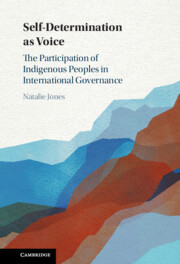Book contents
- Self-Determination as Voice
- Self-Determination as Voice
- Copyright page
- Dedication
- Contents
- Acknowledgements
- Table of Cases
- Table of Treaties
- Abbreviations
- Introduction
- 1 Participation in International Governance and the Logic of Self-Determination
- 2 Finding Support for Indigenous Peoples’ Participation in the Sources of International Law
- 3 The Proliferation of Indigenous Peoples’ Participation, 1982–2007
- 4 Emerging Legal Status? Participation of Indigenous Peoples, 2007–2022
- 5 Conclusion
- Bibliography
- Index
2 - Finding Support for Indigenous Peoples’ Participation in the Sources of International Law
Published online by Cambridge University Press: 04 January 2024
- Self-Determination as Voice
- Self-Determination as Voice
- Copyright page
- Dedication
- Contents
- Acknowledgements
- Table of Cases
- Table of Treaties
- Abbreviations
- Introduction
- 1 Participation in International Governance and the Logic of Self-Determination
- 2 Finding Support for Indigenous Peoples’ Participation in the Sources of International Law
- 3 The Proliferation of Indigenous Peoples’ Participation, 1982–2007
- 4 Emerging Legal Status? Participation of Indigenous Peoples, 2007–2022
- 5 Conclusion
- Bibliography
- Index
Summary
Chapter 2, ‘Finding Support for Indigenous Peoples’ Participation in the Sources of International Law’, turns to a doctrinal analysis. It undertakes an examination of relevant sources of international law on self-determination and Indigenous peoples’ rights, in treaties, declarations, and decisions of international judicial and quasi-judicial bodies. We see how the law of self-determination has been interpreted by the latter bodies as meaning – among other things – participation of peoples at the national (but not necessarily the international) level, and how participation is at the heart of the law on self-determination specific to Indigenous peoples. The chapter then turns to customary international law, reviewing and contextualizing various methodologies for its identification and summarizing how the evidence described in later chapters can be interpreted through these methodologies. Through these lenses, I discuss methodological debates, including the legal status we should assign to the UNDRIP in and of itself, how a provision of the UNDRIP might later crystallize into a rule of custom, and how to regard international organizations in relation to the identification of custom.
Keywords
- Type
- Chapter
- Information
- Self-Determination as VoiceThe Participation of Indigenous Peoples in International Governance, pp. 45 - 80Publisher: Cambridge University PressPrint publication year: 2024



